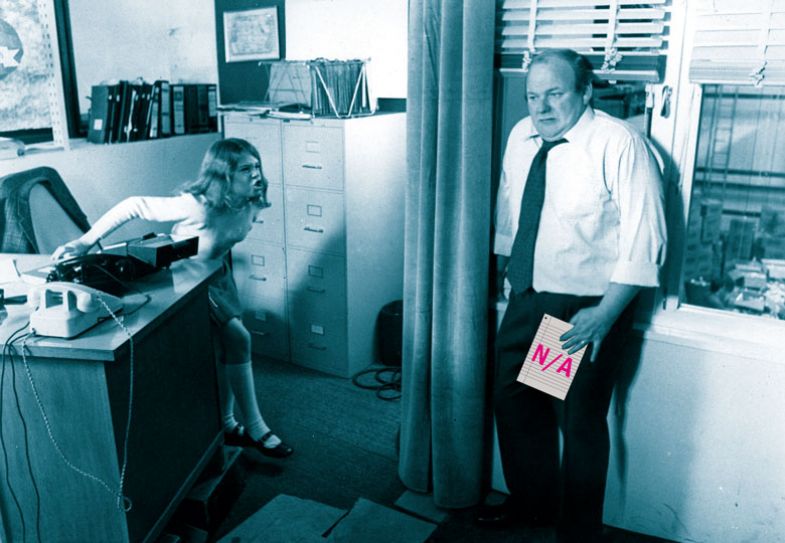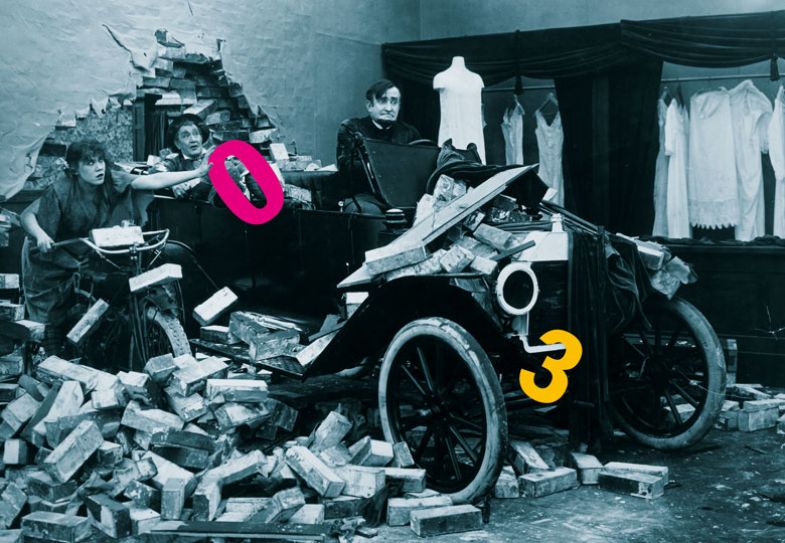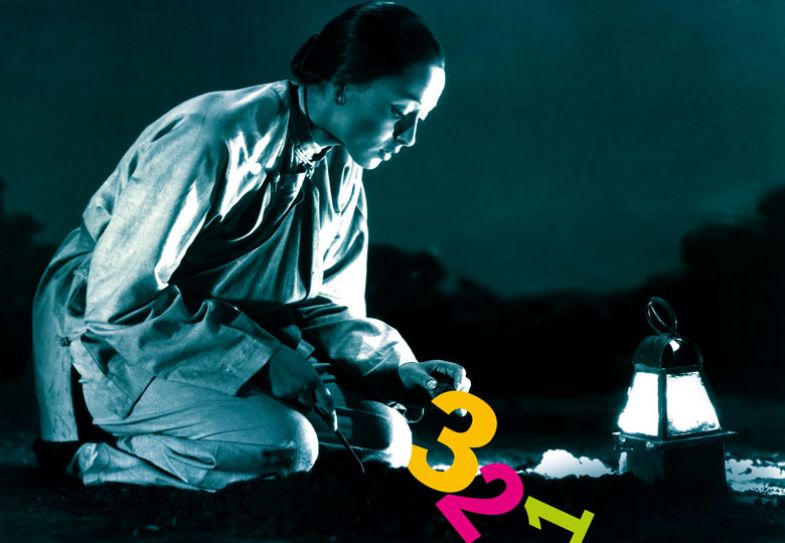‘Outrageous stories are still rare and laughable’
I still cringe to remember the moment when, as an inexperienced and nervous new graduate teaching assistant, one of my brightest students contested the mark I had given her essay.
As many readers know, negotiating one’s grade is a familiar part of American university life. But this student took me out to coffee – out to coffee! – to explain how I had underestimated her work. When one of her friends walked by the cafe, she winked at them in greeting without breaking the flow of our conversation. I didn’t have her confidence, and I can’t wink. I gave her the higher score. I also vowed to avoid being in such a position ever again.
We might associate the contestation of marks with a particular stereotype of American student – one bred for academic success, raised to believe that everything is negotiable in one’s favour, encouraged by ambitious parents never to settle. This image might be a caricature, but perhaps it contains a kernel of truth. I certainly encountered more resistance to my marking at the elite university where I trained than at the well-regarded state university where I first taught full-time. Moving later to the UK, and specifically to a university with an internationally diverse student body, has allowed me to test my assumptions. The results are more varied, more subtle and less dangerous than I had feared – but dangerous they still are.
Campus views: When is a percentage not a percentage? The problem with HE marking practices
Lecturers of my acquaintance seem to agree that the overt, aggressive disputation of marks is still a rarity in the UK. A few of them have crazy stories to report. There’s the student who asked for an essay to be re-marked by a different lecturer after their mother read it and thought it deserved better. There’s the one who got a low first-class mark and nonetheless agitated up the ranks of university admin, demanding that it be changed to the kind of high first I might give only once in five years. But these make good anecdotes precisely because they are so extreme; what they describe is still outlier behaviour. And both cases went nowhere. So my first assumption, that American hustling is infiltrating the British system, doesn’t entirely hold.
I also wondered whether early-career scholars, female academics and scholars of colour encounter more challenges to their marks than do white men in blazers. To my surprise, the few I consulted had very little to report: their marks were largely respected. I expect a national survey might reveal more disturbing results, just as module evaluations demonstrably reflect extreme bias by gender and race. But lacking those results, I also wondered which factors in the British marking system inhibited unhappy students from aggressive grade-grubbing.
The answer, I have decided, lies in a cocktail of social, pedagogical and bureaucratic factors. First, there’s the national RP (received pronunciation) accent, in which the mental phrase “I deserved a first, dammit” is pronounced aloud “Could you please explain why I got the mark I did?” (RP, in this case, might stand for “reroute to politeness”.) Any shrewd lecturer will diffuse tension by simply taking this question at face value and answering it in detail.
Second, there’s the buttress of robust feedback that students receive. In my department, comments are delivered on a standardised form containing separate sections for feedback and “feed forward”, plus a grid that correlates to the exhaustive marking scale included in every syllabus. A student claiming to deserve a higher mark will have to demonstrate exactly how every element of their work met or exceeded every specification on that grid.
Third, there’s the retaining wall of bureaucracy. In the US, I could potentially scrawl “Good effort, B-minus” at the bottom of every essay and call it a day, but that same freedom would also allow me to change my marks at will, arbitrarily and almost endlessly. In the UK, the number of first-class degrees is calibrated across each discipline, and multiple eyes seek to ensure that we’re all marking to the same standards. Marks that have been moderated, second-marked, checked against the marking scale and reviewed by an external examiner have accrued extra layers of authority. A formal appeal must travel through each of those layers in reverse, continually losing steam. Individual lecturers working in the UK have less agency but more backup.
So far, so secure. But danger remains. It lies, to my mind, in two areas. One is administration fatigue. I have already described how the endless bureaucracy that plagues us in our daily lives turns out, occasionally, to have our back – but sometimes it can favour the grade-grubber. If a student threatens to persist in making an almighty fuss, it might seem saner to concede to a slightly higher mark in the first instance, just to avoid spending the rest of the term in special hearings to explain why it was undeserved. If we must pick our battles, why not opt for self-preservation? Sensible in the short term, but might this attitude fuel the gradual erosion of intellectual standards through administrivia and paperwork?
Even more worryingly, by regularly entertaining appeals against marks, we are likely to fuel the pernicious, explicitly destructive notion that students are consumers, purchasing an education – or worse, just a degree – whose worth is measured by tuition money paid and not by amount learned.
But I’m reassured that outrageous stories are still rare and laughable. Overall, my students are lovely and keen, whatever their nationality. When they ask me to explain their mark, they genuinely want to learn. Long may it remain so.
Emily Michelson is a senior lecturer in history at the University of St Andrews.
‘I have given a lot of inflated grades to students for B-grade work’
A few years back, I was offered an adjunct position in English by my alma mater, so I devised a syllabus partly inspired by the approach of my old professor.
As an undergraduate, I was always delighted that he let us talk freely about the great American novels but also goaded us into formulating and articulating opinions. My own students were less thrilled. They wanted the material chunked up like food for a teething toddler or a toothless senior, and not to have to interact with it in the meaningful way that constitutes learning. Passing the test or getting the best grade possible was the only objective.
At another university, the class was outraged when I suggested that they summarise the main arguments of a text. “You’re supposed to give us your summary!” they spluttered.
Against my better judgement, I posted the requested information, but it did not keep me out of my supervisor’s office. “The students”, he said, “are complaining that you have not given them the scoring rubric for the assignment.”
“A rubric in college?” I wonder. I had begun my career as a primary school teacher in Los Angeles. We created rubrics so that parents, many of them Mexican immigrants, knew what to expect. Nonetheless, I hustle around and rustle up a college version, but its use only reinforces my reservations: rubrics standardise responses and create a creativity ceiling. Being in college is about having the skill to interpret an assignment before tackling it.

Later that year, I was back in the supervisor’s office for telling a student, as I handed his essay back, that he should consider visiting the university’s writing centre, which had not existed when I was a student. Then, if you couldn’t write, you didn’t belong in college.
Things worsened at my next semester assessment. While some suggestions about classroom organisation are valuable, my supervisor criticised me for using the word “plaintive” without defining it and for referring to Joan of Arc (at a Catholic college) without elucidating who she was.
When I teach and students pressure me for better grades, I recall my freshman English teacher’s response to my term paper. “This is an A-paper; it may even be publishable,” Sister Mary scowled, “but you are not getting an A. Your mechanics are atrocious.” She had circled my copious errors, told me to correct them, retype it and resubmit it. No extra credit, no better grade. Just be your best, and in your case, honey, that’s a long way off.
My response seemed valid. “Sister, I don’t have my own typewriter.” To her immense credit, she was not intimidated, “A typewriter is not responsible for your run-on sentences and misspellings.” She wanted to be confident that I had A-standard writing habits before she gave me an A. That day, however, I was delirious with a B+. “Imagine,” I thought, “a welfare kid getting such a grade in college!”
It is a good thing that students from lower-class backgrounds have higher expectations these days; it is not good that we lower ours for them. However, students from all backgrounds now seem to feel that if they have done their personal best, no matter where that might fall on the grading continuum, they deserve an A. In fact, I had a student approach me for a better grade arguing just that: “I worked really hard in your class.”
Thus, I have given a lot of inflated grades to students for B-grade work, for which I believe my contemporaries and I would have received Cs and Ds. Almost no Cs are awarded now; it seems that everybody is above average.
Concessions aside, I soon learned that I would not be teaching any of the courses I have cited again. More than once, the news that I would not be offered another contract accompanied the results of the Course Instructor Evaluation Questionnaire. Now that students have become customers, their assessments determine both course content and who teaches it.
“Tried to cover too many things. Do less (sic) pieces more in depth,” complained one student. Another was more specific: “Do one short story and two or three poems.” Per semester? “Graded way too hard,” another moaned.
I take consolation, however, in the knowledge students were not uniformly bad. One wrote: “Don’t pay any attention to my classmates; they’re all babies anyway.”
In such a system, should we wonder why US businesses say they need foreign graduates because they cannot find qualified Americans, or why we score so poorly against other nations? Of course, it is cheaper to let foreign governments educate people and then brain-drain them here, but should we Americans allow our taxes to fund university systems that do not really serve our own people? Or serve only a fraction of them, and badly at that?
S. Keyron McDermott has taught at several leading US universities.
‘It can be hard to give a low mark even for terrible work’
Student complaints in England are soaring, and small wonder given the toxic combination of high fees, rising cost of living, sporadic Covid-era online teaching and ongoing strike action by academics. The perennial grumbles about inadequate and delayed feedback on students’ work almost pale into insignificance compared with that lot.
But while complaints about prejudiced marking are common in other university systems, they don’t seem to be at the top of UK students’ list. The external examining system, flawed though it is, seems to ensure a modicum of fairness across the board because the responsibility for a grade does not rest solely on the individual lecturer. Marks have to be ratified at an exam board, and contentious cases can be handed to the external examiners for greater scrutiny.
Marking is a complex activity, and over the years adjustments have been made to ensure greater fairness. Exam scripts were anonymised; double-marking was put in place; appeals procedures were established. There was also a big push to persuade academics to use the full range of marks, from 0 to 100, rather than the generally used 35-75 range. Although this seemed like a positive move at first, it skewed the number of first- and upper-second-class degrees awarded and, as an external examiner, I saw a very wide range of marking practices and criteria for awarding top grades at different universities.

There are times when a low grade has to be given, but, as I discovered, it is not always easy to do this because there are all kinds of pressures on markers that do not advance the cause of educational quality. I was asked once to second-mark the work of a student with a chequered history. He seemed to have spent most of his three years in the students’ union bar, skipping lectures and seminars without any explanation. He then submitted a piece of coursework for his finals that was not only three weeks late with no excuses offered, but was also half the required length. Added to this, he had ignored all communications from his tutors, so had missed all the deadlines to have the topic approved.
To top it all, he had written about texts that bore no relation to the actual course he had supposedly followed. The first marker, a young lecturer who had recently joined the university, had said the work was unacceptable but would wait for someone more experienced in examining to give it a grade. The head of department asked me to read it to see “if anything could be done” to help the student. Unless the grade was reasonably good, the student was on track to receive a third-class degree or maybe to fail outright.
I gave it a mark of zero. It was rambling and only semi-coherent, in addition to being late, under length and focused on texts that, for all I knew, the student had picked up casually in a charity shop. Scholarly it certainly was not.
But I immediately came under pressure to rethink my grade. The head of department pleaded with me to reconsider, but I pointed out that to give any kind of mark for such abysmal work was unfair on the other students, who had submitted their papers in good faith. So the zero went forward to the exam board for ratification.
Of course, there was a lot of discussion. The external examiner asked about extenuating circumstances, of which there were none, but, again, the head of department asked me to reconsider. When I refused, I was asked what mark might I have given if the work had come in on time, on an approved topic, at the right length and focused on texts taught on the course. I pointed out that none of that had happened and that speculation was not an option.
The other marker remained mute throughout the discussion and stared at the table. When finally asked to consent to the zero, her response was a silent nod. The three members of the small department looked daggers at me and told me afterwards that I was cruel and that my marking was far too harsh. The student just scraped a third-class degree.
The point about this anecdote is that it shows how hard it can be to give a low mark even for terrible work. What I did not realise at first, when I took on the external examining task, was that the department wanted to avoid awarding any low marks because it was under threat of closure and was worried about attracting further scrutiny from the university management.
My refusal to budge from the very low mark was viewed negatively by colleagues, who were prepared to condone poor work and bad behaviour in hopes of a reprieve for their department.
Susan Bassnett is professor of comparative literature at the University of Glasgow.
‘Universities should record and publicise any variance attributable to markers’
It’s easy to imagine how students feel on receiving their marked work back. Pride, perhaps. Sometimes elation. Disappointment, maybe. Anger, even. As educators, we hope that students quickly move beyond these initial emotions to ask what they can learn from the feedback they receive. But there will be times when a different question occurs to them: “Is this mark fair?”
Of course, universities have standard ways of responding to questions about fairness of assessment. UK students are, for example, reassured that appropriate processes of moderation, overseen by an external examiner, are in place. And, of course, these processes are always “robust”.
The extent of the robustness is not visible to students. Sure, they are already party to descriptions of overarching policies described in course handbooks. But the devil is in the detail. It’s all very well asserting that processes are robust. What students should have access to is evidence that this is indeed the case. They ought to be enabled to see further behind the assessment curtain. And for that they need to see outcomes.
For example, it ought to be easy for them to find out what grades have been awarded on each module of their course throughout the year and in previous years. This would enable students to enquire about differences that might be observable across modules. They would be able to see, for example, if there are any systematic differences between grades that are awarded for examinations (whose markers have relatively low visibility to the students), coursework (moderate visibility) and presentations (relatively high visibility).

Some variation is, of course, inevitable because marking depends on complex judgements of individuals. But variation should not be major and persistent. The same cohort of students should not be finding presentations and essays within a given subject domain “easier” than exams. And across cohorts, one should not expect to see some modules with consistently worse (or better) outcomes than others. Alternatively, if a case can be made for such differential outcomes being pedagogically justified, then that case should be set out and made clear to students.
Undergraduates are frequently reassured that it does not matter who assesses their assignments because everyone is working to the same criteria and robust moderation processes are in place, but universities should be more ambitious. Academics’ marking patterns should be known to students, for instance. Such data should not be a secret, known only to course teams. After all, is it fair to expect students to choose a module that entails their work being assessed by markers who are known to award higher or lower grades than others without having access to that information? Instead, universities should record and publicise any variance attributable to markers, which could then be corrected for, or explained and justified. This would also be a fantastic resource for staff development in relation to the enhancement of consistent, well-calibrated marking practices.
Would knowledge of the identities of “easy” and “hard” markers affect the decisions students make about which elective modules to study? Absolutely it would. And that is exactly why they should be given this information. Empowering students in this way would not only be fair in terms of their personal decision-making, it would also cause universities to make every effort to ensure that being a “hard marker” or an “easy marker” was not a thing. More openness always has good long-term effects.
All of that notwithstanding, variations in patterns of outcomes across modules and across markers are inevitable. Assessing work at undergraduate level and above is a challenging task, and calibration of judgements across multiple markers on a course does not happen automatically. Therefore, robust post-marking moderation processes are essential to fairness.
What evidence might reassure students that moderation is robust, as claimed? What evidence would reassure them that it really does not matter who marks their work? In my view, they should be entitled to an answer to the question “What proportion of marks have actually been adjusted this year as a result of the robust moderation processes that are in place?”
My suspicion is that on many courses, the number of marks that actually get altered is nowhere near the number one might expect given the complexity of the independent academic judgements that are involved in deriving those marks in the first place. If students were empowered to know such things, this could drive enhancement of assessment practices.
The answers given to students who enquire about fairness should not just describe abstract assessment processes. They should also contain the concrete outcomes of those processes. If universities are confident in their assessment practices – if, for example, they know who their easy and hard markers are and take reasonable steps to maximise fairness – then this level of transparency should not present any kind of a problem.
Andy Grayson is an associate professor in psychology at Nottingham Trent University.
Register to continue
Why register?
- Registration is free and only takes a moment
- Once registered, you can read 3 articles a month
- Sign up for our newsletter
Subscribe
Or subscribe for unlimited access to:
- Unlimited access to news, views, insights & reviews
- Digital editions
- Digital access to THE’s university and college rankings analysis
Already registered or a current subscriber?










